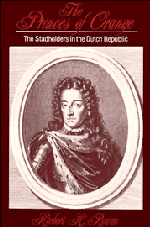Book contents
- Frontmatter
- Contents
- List of illustrations
- Preface
- Prologue: lieutenants of the crown
- 1 William I: from courtier to rebel
- 2 Maurice of Nassau: defender of the Republic
- 3 Frederick Henry: firm in moderation
- 4 William II: the challenger
- 5 The first stadholderless period: 1 exclusion
- 6 The first stadholderless period: 2 return
- 7 William III: stadholder and king
- 8 The second stadholderless period: doldrums
- 9 William IV: neither revolutionary nor reformer
- 10 William V: the era of Anna and Brunswick
- 11 William V: the Patriot challenge
- Epilogue: consequences and conclusions
- Bibliography
- Index
- Title in series
9 - William IV: neither revolutionary nor reformer
Published online by Cambridge University Press: 01 June 2011
- Frontmatter
- Contents
- List of illustrations
- Preface
- Prologue: lieutenants of the crown
- 1 William I: from courtier to rebel
- 2 Maurice of Nassau: defender of the Republic
- 3 Frederick Henry: firm in moderation
- 4 William II: the challenger
- 5 The first stadholderless period: 1 exclusion
- 6 The first stadholderless period: 2 return
- 7 William III: stadholder and king
- 8 The second stadholderless period: doldrums
- 9 William IV: neither revolutionary nor reformer
- 10 William V: the era of Anna and Brunswick
- 11 William V: the Patriot challenge
- Epilogue: consequences and conclusions
- Bibliography
- Index
- Title in series
Summary
By the Spring of 1747 the French were no longer willing to acquiesce in the tremulous neutrality of the Dutch. All of the Austrian Netherlands was now in French hands, and the French army stood at the Dutch frontier. The Dutch were neutral, to be sure, but with a patent bias toward the English and Austria. That was no longer tolerable. On April 17, 20,000 soldiers of Louis XV's army crossed the border into States Flanders (the part south of the Schelde River held by the United Provinces since the early seventeenth century), and prepared to move northward into the heart of the Dutch Republic. The Dutch army was hardly an obstacle; it had offered almost no resistance to the invaders.
The “external event” that could transform the political situation in the Republic had occurred. One leader of the States party stammered to the French ambassador, “You're ruining us, you're making a stadholder.” The French invasion provided the occasion for a revolution that bestowed upon Prince William IV the stadholderate in the recalcitrant provinces, Zeeland, Holland, Utrecht and Overijssel, and made him captain-general of the United Provinces. It was a revolution with almost no violence on behalf of a Prince of Orange who was not a revolutionary, and it wrought an absolute minimum of change in the institutions of the country.
- Type
- Chapter
- Information
- The Princes of OrangeThe Stadholders in the Dutch Republic, pp. 163 - 185Publisher: Cambridge University PressPrint publication year: 1988

